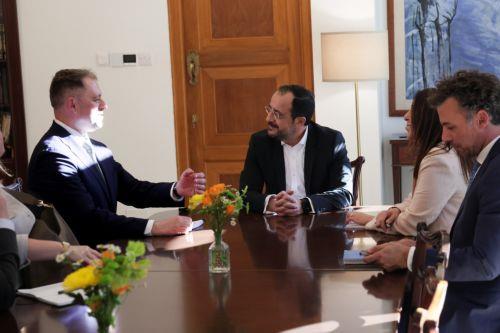Full support for efforts to resolve the Cyprus issue through United Nations resolutions and procedures was expressed by Ireland’s European Affairs Minister Thomas Byrne during a three-day visit to Cyprus.
Byrne said a UN framework remained the best route to a settlement and stressed that any solution would bring “huge benefits” for Cyprus. His visit comes as Ireland prepares to succeed Cyprus in holding the presidency of the council of the European Union in the second half of 2026.
The Irish minister underlined the importance of the EU understanding the specific security and defence concerns of all its member states. He also called for stronger ties with major trade partners while diversifying European trade strategies.
During his visit, Byrne met President Nikos Christodoulides, whom he knows from his time as Cyprus’ foreign minister, as well as European Affairs Deputy Minister Marilena Raouna, parliament’s foreign affairs chair Harris Georgiades, and officials from the UN and the missing persons committee. He also met Irish police officers serving in Cyprus as part of international missions.
Speaking about Ireland’s upcoming role in the EU presidency trio after Cyprus, Byrne identified the multiannual financial framework as a central issue. He said Dublin would seek to advance national interests while working within the broader European agenda.
On defence, he said that Europe faced challenges from Russia as well as security issues in the Eastern Mediterranean. While Ireland is not a Nato member, he said the country would act as an “honest broker” and support the needs of member states that prioritise civilian protection. He also pointed to rising threats in cyberspace and against undersea cables, adding that Ireland was increasing defence spending from its own resources and seeking greater cooperation with European partners.
Byrne said Ireland might use the EU’s Safe initiative in the future, but it did not currently require loans. He highlighted ongoing Irish involvement in peacekeeping operations and said a wider definition of defence was needed, including cyber security and civilian resilience.
Turning to the Middle East, he said Dublin welcomed the recent US peace proposal and initial positive reactions from Arab and Islamic states. He urged Hamas to sign the plan and stressed that Ireland continues to back a two-state solution for Israel and Palestine, a policy it first endorsed in 1980.
On trade, Byrne warned that uncertainty was damaging for growth. He welcomed agreements between the EU and the US, while also emphasising the need to build stronger trade links with Southeast Asia, Africa, South America and Canada.
He also spoke about Britain, noting that Ireland values close relations with the UK after Brexit. He said Dublin welcomed the more open stance of Prime Minister Keir Starmer’s government and the improvement in EU-UK ties. He pointed to cooperation already taking place in security and defence and expressed hope that a new sanitary and phytosanitary agreement could be finalised during either the Cypriot or Irish presidency.
Byrne said normalising relations with Britain was a shared priority for Ireland and the EU, adding that such progress would bring benefits to all sides.






Click here to change your cookie preferences